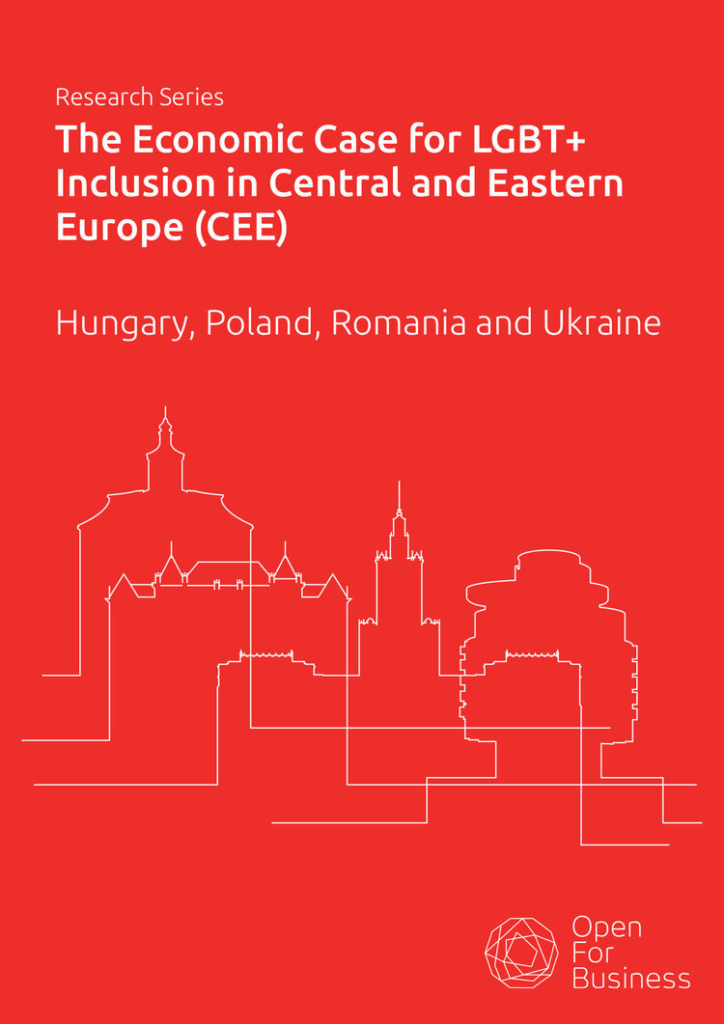This report presents the evidence base that supports this: it demonstrates discrimination costs these economies and that openness and inclusion can aid them in reaching their ambitious economic goals. It also shows that companies that address LGBT+ inclusion can attract better talent and have better financial results.

The report uses a variety of economic research, data analyses, aspirational case studies and a proprietary survey of businesses as evidence for the economic and business case for greater LGBT+ inclusion in the region. It includes summaries of the key issues facing the LGBT+ communities in each of the focus countries as well as the economic goals the countries are striving to achieve. The report correlates a number of economic and other indices against the F&M Global Barometer of Gay Rights (GBGRⓇ), which indexes human rights for gay people globally, and the Global Barometer of Transgender Rights (GBTR™), which similarly indexes human rights for transgender people.
From an economic and business perspective, these countries are in a relatively stable position, and all have bold economic ambitions for the next decade.
The current situation facing LGBT+ people in the region, however, is extremely challenging. Laws in these countries do not provide full equality. Bias, iscrimination and violence towards LGBT+ people are common, especially in non-urban settings; political will to support the LGBT+ community is lacking; and political leaders often scapegoat LGBT+ people for other problems facing their countries.
This level of anti-LGBT+ activity comes at a cost. Open For Business estimates that diminished public health outcomes and lost productivity in the LGBT+ community cost the four countries more than USD 8.6 billion per year. On the other hand, a 10% increase in LGBT+ rights in these countries is associated with a USD 3,700 per capita GDP increase. Rather than lose economic power from discriminatory practices, Open For Business suggests a number of economic and business propositions that will enhance economic growth while building greater inclusion and diversity in the region.
Key Report Findings
More economically successful countries have better records on LGBT+ rights
In addition to GDP, analyses demonstrate high correlation between LGBT+ rights and:
- The World Economic Forum’s Competitive Index
- The World Bank’s Ease of Doing Business Score
- The Global Innovation Index (GII) from the World Intellectual Property Organization (WIPO)
Conversely, corrupt countries have worse records on LGBT+ rights
Data from Transparency International’s Corruption Perception Index show that the higher levels of corruption in these
CEE countries are strongly correlated with LGBT+ rights.
CEE countries are losing foreign investment opportunities due to perceived LGBT+ discrimination
A case study of a European institution choosing not to relocate to Central Europe highlights this point. Trends such as ESG (environmental, social, governance) investing have investors scrutinizing social factors including sexual orientation and gender identity more closely in their decision making.
Skilled workers in the region are leaving to work in more open societies
An analysis of a new World Bank-LinkedIn database shows that regional workers are leaving to work in more open societies and the workers replacing them are coming from less LGBT+ friendly countries. Data also shows that more regional workers in “jobs of the future” are leaving the focus countries while Western European countries are gaining these workers.
Overt LGBT+ discrimination promulgated by political leaders in Hungary and Poland harms national reputation
The media responses generated by these activities are shown to have significant consequences in investor countries and are jeopardizing investment grants.
LGBT+ spending power is a significant contributor to economies
A review of third-party analyses shows that both global LGBT+ spending power and local LGBT+ spending power is significant and worth attracting.
LGBT+ friendly companies outperform their rivals
Local and global data concur that companies that do more to openly welcome LGBT+ workers are more successful financially.
Economies and companies that embrace diversity and inclusion have improved financial outcomes
Having a diverse workforce leads to stronger financial performance. A business case study from the Irish marriage equality referendum provides an illuminating example. Regional case studies from a diverse group of locally and globally owned companies, large and small, and from various sectors, further underscore this crucial point.
Regional businesses are strongly committed to diversity and inclusion practices
A regional survey of 190 human resources professionals regarding attitudes and practices toward inclusive hiring shows a positive response to the commercial benefits of greater LGBT+ and other minority population inclusion.
The report can be downloaded here.
Polish version of the report can be downloaded here.
